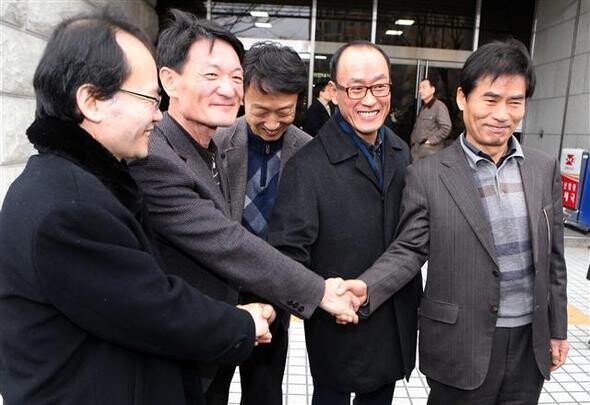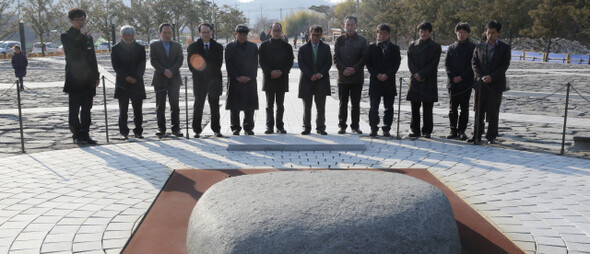hankyoreh
Links to other country sites 다른 나라 사이트 링크
Better late than never for victims in the Burim Case

By Kim Gwang-soo, Busan correspondent
32 years later, the defendants in the so-called Burim Case - which came to public attention when it became the subject of the movie ‘The Attorney’, which was seen by around 11 million people - finally escaped the clutches of the National Security Law.
Han Young-pyo, presiding judge in Criminal Division No. 2 of the Busan Local Court, issued a verdict of not guilty on Feb. 13 for Ko Ho-seok, 56, and four other people who had requested a retrial in the Burim case.
The Burim case refers to an incident in which the government of former president Chun Doo-hwan arrested and tried 19 students and office workers from Sep. to Oct. 1981 who were studying social science books. The case was part of efforts to crush an incipient democratization movement in the Busan area.
“At the time, the police arrested the suspects illegally without a warrant and coerced them into confessing,” the court ruled in regard to charges of violating the National Security Law. The law has long been criticized as an undue limit on civil liberties, as it criminalizes various forms of free expression.
“The defendants said that they had not been tortured or subjected to cruel treatment when they were being questioned by the prosecutors. However, considering that the defendants were illegally confined for a substantial period of time and that the confessions that the prosecutors submitted as evidence were written after much time had passed, the prosecutors’ report cannot serve as evidence,” the ruling stated.
The court also found the defendants not guilty of violating the Martial Law Act. “The defendants did violate sections of the Martial Law Act,” the court ruled, “but this was justifiable since it was intended to check and oppose the criminal activity of the military regime of Chun Doo-hwan, who seized power through a coup d’etat on Dec. 12, 1979 and through the Gwangju massacre on May 18, 1980.”
The court acquitted the defendants of charges of violating the Act on Assembly and Demonstration since those regulations have since been revoked. As for the charges of sheltering fugitives, the court found that helping fugitives could not be viewed as a crime since the fugitives in question had not committed any crimes.
Seol Dong-il, 57, was found not guilty after thirty-two years. “Much time has passed, but I’m happy that the truth has finally been revealed, even as late as this,” said Seol. “In the future, the power of the state must not be abused in this fashion. Even though evidence came to light of illegal torture and violence, the prosecutors have not atoned for their wrongdoing. I hope this will lead them to reflect on their misdeeds. A special law should be enacted to provide relief to the people who were victimized under the Chun Doo-hwan regime.”
Eleven of the 19 suspects applied for a retrial in 1999, but seven of them were only acquitted of the charges of violating the Martial Law Act (and not charges of violating the National Security Law).
In a separate trial, Ko and the other four defendants applied for an additional retrial in Aug. 2012 and were acquitted of all charges. With five of the victims in the Burim trial completely exonerated in the retrial on Thursday, it is likely that the other fourteen defendants will also apply for a retrial of charges of violating the National Security Law.
The prosecutors said that they would decide whether or not to appeal the decision after reviewing the judicial verdict in the retrial.
While five of the victims in the Burim Case were found innocent in the retrial 32 years later, those who were guilty of confining, assaulting, and torturing them cannot be prosecuted because the statute of limitations has expired. A special law could be enacted to investigate and prosecute the perpetrators regardless of the statue of limitations in order to prevent innocent people from being sacrificed to state-authorized violence.
It is likely that the three police officers who tortured and committed violence against the defendants in the Burim Case cannot be tried under current laws. In Apr. 2011, 14 of the defendants in the Burim Case pressed charges against two police officers who were complicit in the torture for incarcerating them without permission, but the police officers were cleared of charges because the statute of limitations had already expired. The remaining police officer has already passed away.

Please direct questions or comments to [english@hani.co.kr]

Editorial・opinion
![[Editorial] Japan’s rewriting of history with Korea has gone too far [Editorial] Japan’s rewriting of history with Korea has gone too far](https://flexible.img.hani.co.kr/flexible/normal/500/300/imgdb/original/2024/0422/1717137715201877.jpg) [Editorial] Japan’s rewriting of history with Korea has gone too far
[Editorial] Japan’s rewriting of history with Korea has gone too far![[Column] The president’s questionable capacity for dialogue [Column] The president’s questionable capacity for dialogue](https://flexible.img.hani.co.kr/flexible/normal/500/300/imgdb/original/2024/0422/1517137717613239.jpg) [Column] The president’s questionable capacity for dialogue
[Column] The president’s questionable capacity for dialogue- [Column] Are chaebol firms just pizza pies for families to divvy up as they please?
- [Column] Has Korea, too, crossed the Rubicon on China?
- [Correspondent’s column] In Japan’s alliance with US, echoes of its past alliances with UK
- [Editorial] Does Yoon think the Korean public is wrong?
- [Editorial] As it bolsters its alliance with US, Japan must be accountable for past
- [Guest essay] Amending the Constitution is Yoon’s key to leaving office in public’s good graces
- [Editorial] 10 years on, lessons of Sewol tragedy must never be forgotten
- [Column] A death blow to Korea’s prosecutor politics
Most viewed articles
- 1Samsung barricades office as unionized workers strike for better conditions
- 2[Editorial] Japan’s rewriting of history with Korea has gone too far
- 3[Column] The president’s questionable capacity for dialogue
- 4Korean government’s compromise plan for medical reform swiftly rejected by doctors
- 5[Reporter’s notebook] Did playing favorites with US, Japan fail to earn Yoon a G7 summit invite?
- 6[Column] The clock is ticking for Korea’s first lady
- 7[Column] Are chaebol firms just pizza pies for families to divvy up as they please?
- 8What Israel’s ‘warning shot’ response to Iran means for Middle East tensions
- 9[Column] Has Korea, too, crossed the Rubicon on China?
- 10Korea protests Japanese PM’s offering at war-linked Yasukuni Shrine